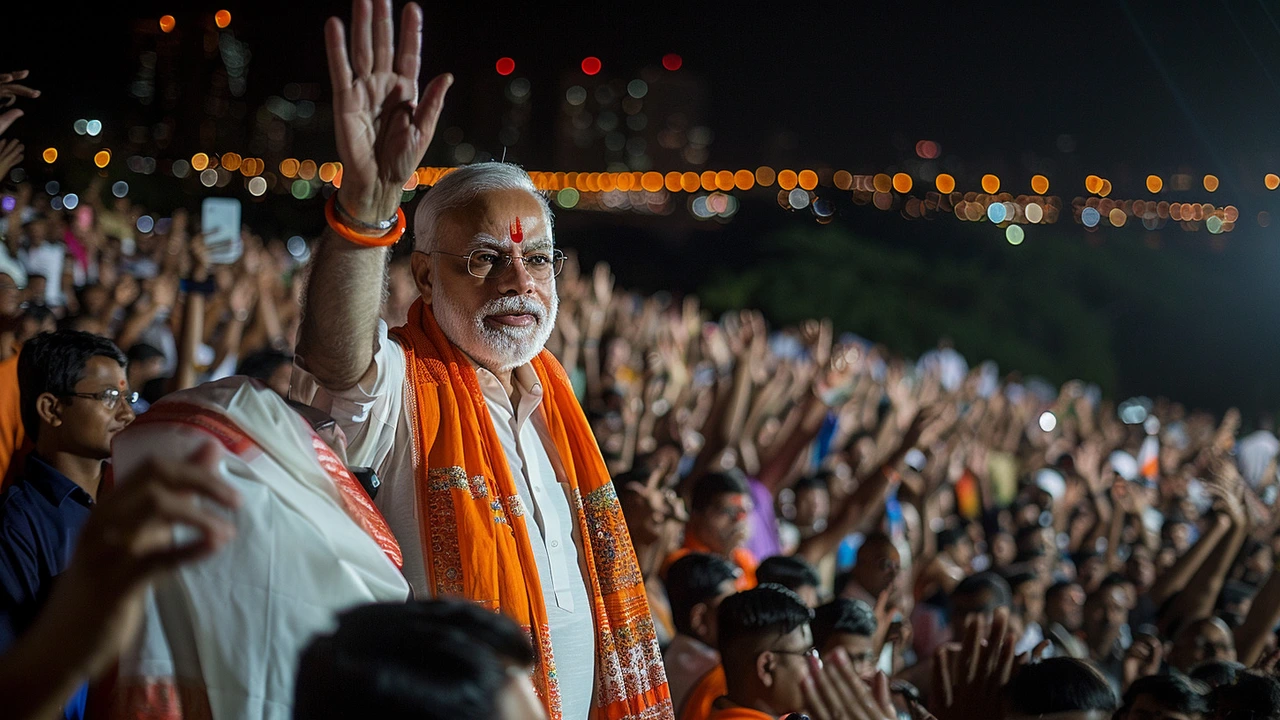India’s Early Election Results Signal a Potential Setback for Modi and BJP
In a surprising twist during India’s latest parliamentary elections, early vote counts indicate that Prime Minister Narendra Modi's Bharatiya Janata Party (BJP) may fall short of securing a majority in the 543-member Lok Sabha lower house. This potential outcome represents a significant departure from Modi's historically unbroken streak of electoral dominance over his 23-year political career, where he has never failed to secure a majority in either state or national elections.
Modi, renowned for his charismatic leadership and strongman image, has managed to captivate a broad swath of the Indian electorate over the years. However, the initial vote tallies suggest that this time, the BJP might struggle to retain the overwhelming support it has enjoyed in the past. As the vote counts trickle in, it becomes increasingly clear that the BJP might have to rely on its allies to form the government, a scenario that could introduce complexities and necessitate political concessions.
Economic Concerns and Campaign Missteps
The unexpected shift in voter behavior has had immediate ramifications, notably causing a significant dip in Indian stock markets. Investors and political analysts alike are scrutinizing what this potential change in power dynamics means for India's future, especially in terms of policy direction. Central to these concerns is whether Modi will be able to push through his agenda, particularly with respect to contentious labor reforms that have faced resistance.
Analysts point to a critical oversight in Modi's campaign strategy: an over-reliance on his personal appeal while neglecting pressing economic issues such as inflation and job creation. The electorate’s growing discontent with these unaddressed challenges highlights a gap in the BJP's messaging, one that was evidently exploited by opposition parties. This shift has prominent implications, particularly for voter-rich regions that have traditionally supported the BJP but now appear disillusioned with the status quo.
Shift in Traditional Strongholds
Notably, the results suggest a decline in support from the devout Hindu heartland, long considered a BJP stronghold. This area, which has reliably bolstered Modi and his party's electoral successes over the years, seems to be experiencing a political awakening of sorts. Factors contributing to this change include a perceived neglect of local economic and social issues, as well as a broader disillusionment with Modi's national governance.
Further compounding BJP’s challenges are the inroads made by the Congress and Samajwadi opposition parties, who appear poised to capture more than half of the seats in the influential state of Uttar Pradesh. This shift could significantly alter the balance of power in the Lok Sabha and poses a formidable challenge to BJP’s dominance. Furthermore, regions like Kashmir and Manipur, known for their restive political climates, have also shown signs of dissatisfaction with government policies. This regional unrest signals a potential for increased political volatility and demands greater sensitivity to local issues in future governance.
Electoral Strategy and Criticisms
Critics of Modi argue that his campaign rhetoric, which often played on religious and caste divisions, may have backfired. While such strategies have historically galvanized key voter segments, the current electoral climate suggests a fatigue with divisive politics. The voters, it seems, are seeking more substantive policy discussions and solutions to their everyday problems.
The potential outcome of these elections could lead to significant pressure points for the incumbent government. Increased electoral scrutiny and a more fragmented parliament might also embolden autonomous institutions and invigorate public debate. For Modi, this could mean greater criticism and a need for more coalition-building and compromises to push through legislative agendas.
Future Implications
As the final vote counts are awaited with bated breath, the implications of these early results are already becoming the subject of intense speculation. For India's economic policies, particularly those stalled or opposed due to lack of consensus, the necessity for alliances and negotiations could either slow down decision-making or lead to more balanced and widely accepted policies.
On the socio-political front, a reduction in BJP's authority could lead to more pluralistic approaches in governance and a pivot away from polarizing rhetoric. Observers speculate that Modi's ability to adapt to this new political landscape will be crucial. Whether he can reignite his electoral magic or if this marks the beginning of a shift towards a more diversified political representation in India remains to be seen.
The coming days and weeks will undoubtedly provide further clarity, but as things stand, the early election results have undeniably introduced an element of uncertainty in Indian politics. The electorate's message seems clear: issues like inflation, job creation, and social harmony cannot be sidelined in favor of charisma and historic success. It is a reminder that leadership must continually evolve to meet the changing aspirations and concerns of its people.








15 Comments
Hey folks, even if the numbers look tough, remember the BJP has btween back before. Keep believing in change and stay positive, we’ll see how the story unfolds.
Wow, what a shift! 😮 It's exciting to see voters caring about jobs and inflation. Maybe this will push all parties to focus more on real issues rather than just charisma. Stay hopeful, the market will adjust.
It is evident that the electorate is demanding accountability from their leaders. The BJP will need to reassess its strategy and address core economic concerns. This could lead to a more balanced parliamentary debate.
From a market perspective, the dip in stocks reflects uncertainty, but it also opens opportunities for savvy investors. Diversify your portfolio: look into sectors like renewable energy and consumer staples which may be less volatile. Keep an eye on policy shifts and you might find hidden gems 😎
Oh, the drama! Who would have thought the mighty Modi could possibly stumble? Clearly the voters woke up and smelled the… same old promises. Guess the ‘charisma’ wagon finally hit a pothole.
meh, just another political rollercoaster, nothing fresh.
Let’s unpack the entire narrative of this election with the precision of a surgeon wielding a scalpel of insight. First, the BJP’s historical dominance was not built on a single charismatic figure but on a complex lattice of ideological cohesion, patronage networks, and fiscal policies that resonated with a broad swath of the electorate. Second, the early vote tallies suggest a breach in that lattice, an anomaly that cannot be dismissed as a mere statistical blip, because the data points to a genuine erosion of confidence among previously loyal constituencies. Third, the market’s reaction-a precipitous fall in indices-serves as a real‑time barometer of investor sentiment, indicating that capital markets are sensitive not just to policy but to perceived stability. Fourth, one must consider the labor reform agenda, which has been framed as a boon for efficiency but has alienated large segments of the working class. Fifth, the BJP’s campaign relied heavily on personality politics, neglecting the undercurrents of inflation and unemployment that have been gnawing at household budgets. Sixth, the opposition’s ability to capitalize on these gaps demonstrates a strategic recalibration that could reshape coalition dynamics. Seventh, regional discontent in Uttar Pradesh, Kashmir, and Manipur highlights the fact that a one‑size‑fits‑all approach is no longer viable in a heterogeneous polity. Eighth, the potential need for coalition‑building is not merely a tactical compromise but a structural shift that could democratize policy formulation. Ninth, the presence of more voices in the Lok Sabha could foster a healthier debate on economic reforms, potentially leading to more nuanced legislation. Tenth, however, there is a risk that fragmented mandates could stall decisive action, especially in times of economic turbulence. Eleventh, the international community will be watching closely, as India’s trajectory influences global supply chains and geopolitical balances. Twelfth, this moment offers an opportunity for civil society to demand greater transparency and accountability from all parties. Thirteenth, voters have clearly signaled that rhetoric lacking substantive solutions will no longer suffice. Fourteenth, the BJP must now confront the reality that charisma alone cannot sustain a majority. Fifteenth, whether they adapt or double‑down on old tactics will determine not just their political fate but the broader health of Indian democracy. In sum, the early results are a clarion call for introspection, recalibration, and perhaps, a more collaborative governance model.
The so‑called “BJP juggernaut” is nothing but an overinflated myth, a narrative crafted by media echo chambers to mask the underlying fiscal decay. Their recent missteps reveal an empire built on sand, teetering on the brink of irrelevance.
In the annals of political theatre, this election shall be recorded as a tragicomedy of hubris, where the protagonist, draped in saffron, finds his script rewritten by the unforgiving hand of the electorate. One cannot help but feel the melancholy of a legacy unravelling before its climax.
The data suggests that voter concerns are trending towards tangible issues: inflation, job security, and healthcare. Policymakers should prioritize actionable plans that address these areas to rebuild trust.
The electorate's verdict is a sophisticated rebuke to complacency; it demands nuanced governance
While many herald this shift as a watershed moment, one might argue it is merely the cyclical rhythm of democracy-an inevitable oscillation that tempers any prolonged dominance. The true significance lies not in the seat count but in the evolving discourse that now embraces pluralism over singularity.
Ah, the moral tapestry of a nation is woven with threads of accountability!; The masses have spoken, and their chorus reverberates with the lament of unfulfilled promises!; Let this be a clarion call to all who wield power: humility must supplant hubris!; Indeed, the very foundations of governance are being tested, and only those who heed the ethical summons shall prevail!
Well, looks like the big party finally realised they can't ignore basic problems. Who would've thought?
Let's channel this momentum into constructive dialogue across party lines, fostering policies that truly serve the nation's diverse populace. Aggressive cooperation, not adversarial posturing, will pave the way for sustainable progress.